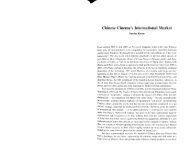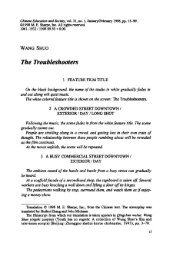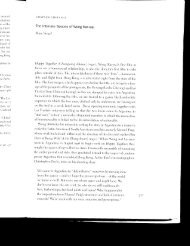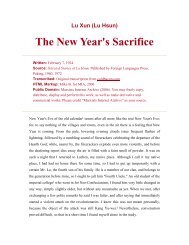Popular Cinema and Political Thought in Post-Mao China
Popular Cinema and Political Thought in Post-Mao China
Popular Cinema and Political Thought in Post-Mao China
You also want an ePaper? Increase the reach of your titles
YUMPU automatically turns print PDFs into web optimized ePapers that Google loves.
~. Pickowiczc film washad theirmovementhitewashcdonfront<strong>in</strong>gRevolutionleSS of theication forom powerld not thecourage towas note Culturalthe partycadres likeonsible for957. Party<strong>and</strong> to bethey were~abilitation>r speak<strong>in</strong>gone's ownextremelycont<strong>in</strong>uedfor life.ed that he~arty <strong>in</strong> ther directivesto exerciseo hear the> the rightThe partyMounta<strong>in</strong>categories.rty people,1 as honest<strong>and</strong> evil.ersed. Theof heart,atives whod corrupt.a<strong>in</strong>, lookedthe sources<strong>Popular</strong> <strong>C<strong>in</strong>ema</strong> <strong>and</strong> <strong>Political</strong> <strong>Thought</strong> 47of problems that plagued Ch<strong>in</strong>a <strong>in</strong> the early 1980s. This work stated explicitlythat gr<strong>in</strong>d<strong>in</strong>g poverty became a characteristic of village life not <strong>in</strong> the CulturalRevolution, but with the advent of collectivization <strong>in</strong> 1956. The protagonist'sfather, Shen Shanwang, had been stripped of his lead<strong>in</strong>g position <strong>and</strong> ostracizedbecause, like Luo Chun <strong>in</strong> The legend of Tianyun Mounta<strong>in</strong>, he spoke outaga<strong>in</strong>st the Great Leap Forward <strong>in</strong> 1958. And, like Luo Chun, he was notamong those whose reputations were cleared <strong>in</strong> the years immediately follow<strong>in</strong>gthe Cultural Revolution. Three years had passed s<strong>in</strong>ce the death of <strong>Mao</strong>,but this village was still dirt poor. Sl1en's family did not have enough toeat or enough to wear, <strong>and</strong> lived <strong>in</strong> a depress<strong>in</strong>g hovel.A corner forgotten by loYe, even more than The legend of TianyunMounta<strong>in</strong>, argued that the party's failure to address political problems thatpre-dated the Cultural Revolution made it extremely difficult for the ruraleconomic reform policies adopted by the party center <strong>in</strong> 1978 to beimplemented <strong>and</strong> for economic progress to take place. Xu Rongshu, theyoung cadre who returned from the navy <strong>in</strong> 1979, has heard that populareconomic reforms, such as private household sidel<strong>in</strong>es <strong>and</strong> private commerce,have been implemented elsewhere, but the veteran leaders of the village, likethe cadre Wu Yao <strong>in</strong> The legend of Tianyun Mounta<strong>in</strong>, are afraid of mak<strong>in</strong>grightist errors <strong>and</strong> refuse to consider reforms that will improve st<strong>and</strong>ardsof liv<strong>in</strong>g. They will wait until they receive the appropriate <strong>in</strong>structions fromhigher authorities.The notion that Ch<strong>in</strong>a's economic development, especially <strong>in</strong> the ruralsector, had stagnated for more than twenty years after 1956 was advanced<strong>in</strong> both films through the assertion that prosperity could be possible onlyby turn<strong>in</strong>g the clock back <strong>and</strong> adopt<strong>in</strong>g the plans set forth by those categorizedas rightists <strong>and</strong> counterrevolutionaries <strong>in</strong> 1957. In the first film, rightistLuo Chun's elaborate plan for the development <strong>and</strong> modernization of theTianyun Mounta<strong>in</strong> region was dropped <strong>in</strong> 1957 <strong>and</strong> replaced by characteristically<strong>Mao</strong>ist schemes, all of which failed miserably. Only <strong>in</strong> 1979 wasLuo's plan rediscovered <strong>and</strong> adopted. In the second film, Shen Shanwangwas victimized <strong>in</strong> 1958 for advocat<strong>in</strong>g the cultivation of cash crops. But <strong>in</strong>1979 it was precisely the subject of cash crops that so excited young XuRongshu, who turned to the old rightist, Shen Shanwang, for advice.Once aga<strong>in</strong>, the party regulars were the negative characters, while therightists who had suffered for twenty years were presented as martyrs of thepeople. This tendency was especially apparent <strong>in</strong> the titillat<strong>in</strong>g <strong>and</strong> controversialscenes of youthful sexual awaken<strong>in</strong>g that lead to the suicide of Shen'seldest daughter. Official moral doctr<strong>in</strong>e taught that premarital sexual activityis degenerate. Yet the audience could see that the two young lovers werenot only sympathetic characters, but also that their union seemed to be theonly source of joy <strong>and</strong> spontaneity <strong>in</strong> an otherwise loveless, colorless, <strong>and</strong>oppressive environment. Like the rightists, the sexual partners were presentedas heroes <strong>and</strong> martyrs. She was driven to suicide <strong>and</strong> he began serv<strong>in</strong>g along prison sentence. Critics of the movie, not surpris<strong>in</strong>gly, accused thefilmmakers of propagat<strong>in</strong>g bourgeois humanism. That is, <strong>in</strong>stead of discuss<strong>in</strong>g






